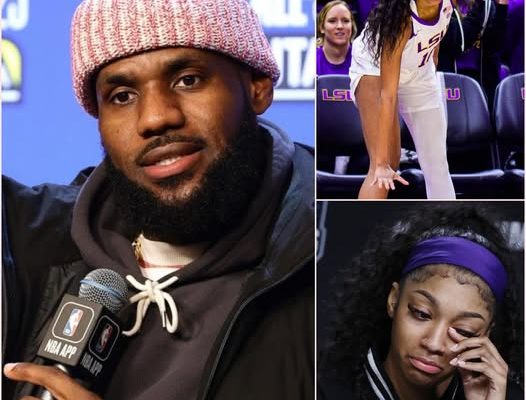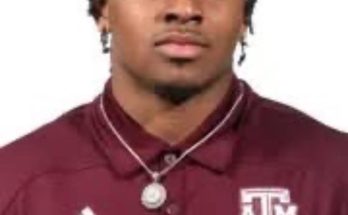When LeBron James speaks, the sports world listens — but few could have predicted the storm he would unleash when he chose to defend Angel Reese in front of millions. The Los Angeles Lakers superstar and four-time NBA champion has never shied away from using his voice to stand up for what he believes in. But this time, his target was not a rival franchise or league policy — it was the way the basketball community itself has treated one of its most talked-about young stars.
Angel Reese has been under a microscope since her meteoric rise in college basketball. Known for her brash confidence, expressive demeanor, and unapologetic flair on the court, Reese drew both praise and criticism in equal measure during her time at LSU and now as she embarks on her WNBA journey. When she led LSU to a national championship, her taunt toward Caitlin Clark — who had done similar gestures in previous games — set off a cultural firestorm. Pundits, fans, and even former players weighed in, many casting her behavior as unsportsmanlike, while others, particularly within the Black sports community, saw it as a clear double standard. The same actions that earned white athletes labels like “competitive” or “fiery” were earning Reese terms like “classless” and “disrespectful.” That disparity didn’t go unnoticed, and it certainly didn’t go unaddressed.
Enter LeBron James. In an impassioned post on social media and later in a media session, James made it clear that Angel Reese was being held to an unfair standard — one that he was all too familiar with. He reminded the world of the vitriol he himself received as a young player, not for misdeeds, but for confidence and dominance that disrupted the status quo. He pointed out that the issue wasn’t Angel Reese’s behavior — it was how certain behaviors are interpreted depending on who displays them. LeBron didn’t just defend her — he contextualized her experience within a broader societal narrative of racial bias, gendered expectations, and the policing of Black excellence.
James’ words weren’t performative; they came from a place of shared experience and generational frustration. In doing so, he didn’t just lift Reese’s name — he also lifted the veil off a pattern that has played out time and time again in sports. From Serena Williams to Richard Sherman, outspoken and passionate Black athletes have consistently found themselves in the crosshairs of cultural debates that seem less about sportsmanship and more about control. Reese, in LeBron’s eyes, was the latest example of this dynamic — a player being told to be less, do less, and say less in order to be accepted.
LeBron’s backing of Reese reverberated across the basketball world. Former players began to speak up, and media outlets began reevaluating their narratives. The conversation shifted — not entirely, but enough to give pause to those who had been quick to pile on criticism. Support came in from players in both the NBA and WNBA, with many acknowledging that Reese’s treatment was reflective of a broader issue within the culture of basketball, particularly in how young Black women are perceived and judged.
The WNBA, long a battleground for respect and visibility, became a focal point in this debate. As Reese transitioned into the league, the scrutiny didn’t subside. Every stat, every expression, and every post-game quote became a topic of analysis. Some questioned whether she was more focused on building her brand than her game, conveniently ignoring the fact that the league has been begging for players to be marketable, visible, and culturally resonant. Reese, like James, understood that greatness on the court didn’t have to come at the expense of authenticity off it.
LeBron also highlighted another critical point — the role of fans and media in shaping narratives. Reese didn’t ask to be the face of a movement, but she became one. And in doing so, she was forced to navigate a spotlight that was at times searing. The pressure on young athletes today is unlike anything before. With social media, 24/7 news cycles, and constant comparisons, every move is magnified. For Black women in particular, that magnification often comes with a level of criticism that is personal, coded, and relentless.
In defending Reese, James wasn’t merely calling for fairness — he was calling for evolution. He was calling for a sporting culture that celebrates individuality instead of punishing it. He was calling for a media landscape that examines its biases before issuing moral verdicts. And he was challenging fans to question why they cheer swagger from one player and condemn it from another.
This wasn’t the first time LeBron had taken a public stance on an issue of equity and justice. Over the years, he has spoken out on police brutality, voting rights, education, and systemic racism. His work off the court — most notably the creation of the I PROMISE School — has reinforced his commitment to lifting up communities and voices that often go unheard. In Angel Reese, he saw a young athlete trying to chart her own course through a landscape that demanded conformity. And he wasn’t going to let her walk that path alone.
For Reese, the backing from LeBron was not only a defense but a validation. In interviews following his comments, she expressed gratitude and also a sense of empowerment. To have someone of LeBron’s stature affirm her value as a player and a person sent a message that rippled through locker rooms and boardrooms alike: that she mattered, and that her story was worth defending. Her teammates rallied around her. Coaches publicly backed her. And perhaps most importantly, young girls watching — especially young Black girls — saw that confidence and passion weren’t flaws but strengths.
Critics, of course, didn’t disappear. Some doubled down, accusing Reese of playing the victim or using controversy to elevate her profile. But the tide had shifted. Reese was no longer just a lightning rod — she was a symbol. And symbols, especially in sports, have a way of shaping the future.
LeBron’s defense of Reese also invited comparisons to his own early career. Like Reese, he entered the national conversation young and unfiltered. His confidence was often mistaken for arrogance. His failures, when they came, were treated as personal betrayals by a public that had crowned him “The Chosen One.” Through it all, James learned to weather the storm without compromising who he was. That experience, hard-won and deeply personal, shaped the tone and substance of his support for Reese. He wasn’t projecting — he was remembering.
And as the NBA legend defended the rising WNBA star, a new kind of blueprint began to form — one where established stars actively mentor and protect those coming up behind them, not just privately but publicly. It was a reminder that legacy isn’t just about rings and records. It’s also about stewardship. LeBron knows that one day he’ll be gone from the game, but the athletes who follow him will inherit the culture he helps shape. Standing up for Angel Reese wasn’t just about her — it was about all the voices that deserve to be heard and all the talents that deserve room to grow.
It also challenged the WNBA to confront some of its internal contradictions. The league wants attention, drama, passion — but how it reacts when those things show up in unexpected packages says a lot about how far it still has to go. Reese is marketable, talented, and unapologetically herself — exactly the kind of player the league claims to want. If she were quieter, more reserved, would she be as compelling? Perhaps not. But the fact remains: her presence forces the WNBA to decide what kind of league it truly wants to be.
As the season progresses, Angel Reese continues to play hard, speak truthfully, and remain unwavering in her approach. She’s not perfect — no athlete is. But perfection was never the point. Representation, authenticity, and fairness are. And thanks to LeBron’s vocal support, she now navigates that road with a bit more wind at her back.
The world of sports often pretends to be a meritocracy — that talent rises, that results speak louder than anything else. But time and again, the reality proves more complex. Image matters. Narrative matters. And who controls the narrative matters most of all. By stepping into that arena, LeBron reminded everyone that power — real power — isn’t just about scoring 30 points a night. It’s about standing up for someone when it would be easier to stay silent.
Angel Reese may be young, but she’s already made history. And now, with veterans like LeBron James in her corner, she has a chance to do something even more lasting — to change how history is written for the next generation of players like her. That, more than any stat line or championship, may end up being her most important legacy.
And for LeBron, the defense of Reese won’t be the last time he wades into uncomfortable territory. But it will be remembered as one of the most poignant — a moment when a giant used his platform not just to elevate a fellow athlete, but to illuminate an entire system. In doing so, he didn’t just protect Angel Reese — he challenged the culture to grow up, catch up, and show up. The message was clear: if you can’t handle confidence, you’re not ready for greatness. And greatness, in all its forms, is here to stay.



